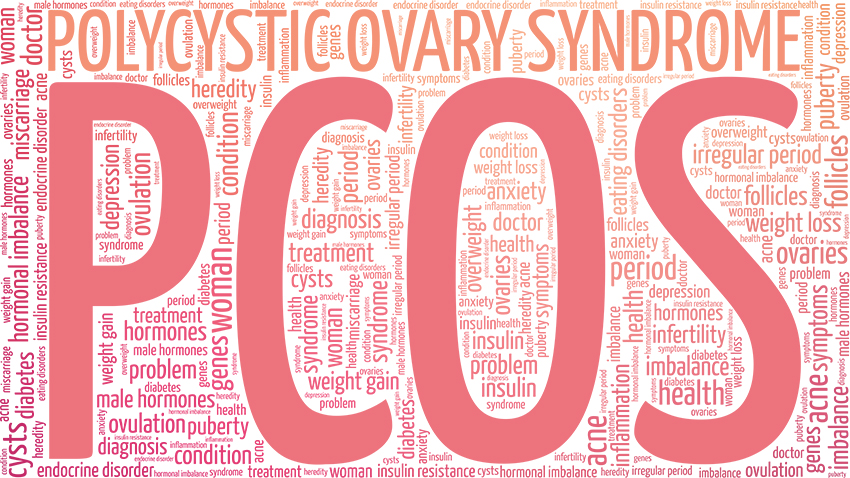|
Listen the Post
Getting your Trinity Audio player ready...
|
Almost 1 in every 10 Indian women suffer from PCOS and more and more women around the world are succumbing to this disorder. Polycystic ovaries start showing its effects in terms of high blood sugar levels, hypertension, obesity, sleep difficulties, and menstrual irregularities, then we call it PCOS or Polycystic Ovarian Syndrome. The body does not go through regular ovulation as a result, so the eggs that are not properly released each month often swell and cluster around the ovaries, forming cysts. 50% of women usually go undiagnosed i.e. they don’t even know that they have PCOS. While half of the total cases are at high risk of getting pre-diabetes or Type II diabetes by the time they reach the age of 40s.
Ayurveda does not use the word “hormones.” It has its own vocabulary and terminology. Hormones are thought to be combustion components in the tissue. Hormone activity reflects the essence of pitta, the force responsible for the change. Ayurveda recognizes PCOS as a kapha dosha dominant condition and thus is aimed at addressing the symptoms of PCOS by correcting the triggering factors. Some PCOS-derived features are closely related to some Yonivyapad features (an anatomical and physiological disorder of the reproductive system), while others are roughly related to Artava Dushti. PCOS can be best understood using Acharya Charak’s three fundamental principles:
- Vikar-prakriti: Disease and its prominent constituents
- Adhisthan-antara: Variation in the site of disease
- Samutthan-vishesha: Specific onset of the disease with specific aetiology
PCOS is characterised by various annoying symptoms like irregular menses, baldness, acne, facial hair growth, mood changes,trouble conceiving, weight changes and many more. Yet despite all other complexities, these signs aren’t so difficult to curb. PCOS diagnosed women usually experiences;
- Menstrual irregularities: Abnormal menstruation, absence of menstruation, heavy menstruation, irregular menstruation, short and light menstruation, or spotting.
- Metabolic changes: Obesity, overweight, or drastic weight gain, metabolic syndrome, insulin resistance, type 2 diabetes.
- Dermatological issues: High levels of androgens typically lead to various dermatological symptoms like balding, acne or oily skin, hirsutism or unwanted hair growth (face, abdomen, chest, and back), dry patches of skin in folds and creases or skin discoloration.
- Reproductive issues: Infertility, pre-eclampsie, miscarriage,ovarian cancer , breast cancer etc,
- Psychological issues: Anxiety, depression, disordered sleep, sleep apnea
A pill or capsule is just a temporary treatment, your lifestyle, and triggering factors need to be addressed in the first place. Lifestyle changes does not imply only a diet plan! Working on each of the basic aspects step-by-step is a must. Lifestyle changes appear to be the most often used therapy for PCOS.
- Mindful eating: Avoid over-eating/under-eating, consume enough nutrients and fiber by including a rainbow variety of food types. Whole foods, fibre rich, at least 90% plant-based must be opted.
- Staying active: Choose any physical activity or workout to enjoy self-care time and help you de-stress. At least 250 minutes per week slow strength workout and cardio is must along with healthy yoga poses.
- Healthy sleep cycle: Remember to get a good amount of sleep regularly, avoiding any screen time at least one hour before bed is a must, as per natural circadian rhythm.
- Consistent daily routine: Make sustainable changes to the daily routine to be consistent.
- Emotional wellness: Reassess toxic elements in life including relationships whether personal or professional.
- Practising yoga: Yoga and meditation are amazing tools to bolster overall health, as they play an important role in preventing PCOS symptoms. Specifically, yoga works by aiding in weight management, improving blood circulation to the ovaries, regulating endocrine gland activity to balance hormonal levels. One can try Surya namaskar, Baddha konasana, Naukasana and Chakki chalanasana to begin with.
PCOS can be a disturbing condition, especially if left to manage alone. But fear not, Ayurveda is always there to help in the journey with its amazing meraki Ayurvedic herbal medications like Knachnar Guggulu, RajahPravartani Vati, Arogyavardhini Vati, Varanadi Kashayam, Pushpadhanva Rasa, and many more that have a range of herbs including Shatavari, Ashoka, Kanchanara and Pippali to ease the menstrual irregularities. There is no one-size fits all Ayurveda regime for PCOS. Personalized treatment guidance is highly recommended for all women. However, the evidence does suggest that Ayurvedic herbs with low glycemic food, healthy fats, and yoga are key to managing PCOS.
Don’t forget, PCOS may not be curable but can definitely be managed and reversed like it doesn’t exist anymore. That’s the power of Ayurveda. With both Shodhan chikitsa or purificatory measures along with Ayurveda medicines, diet (pathya aahara), and physical activity (vihara), one can correct the imbalance in the hormones resulting in normal and regular menstrual cycle patterns. Anything that makes our minds and body relax, improves metabolism, and boosts reproductive health is good for PCOS management.
Ayurveda Health Counsellor Health and Wellness Blogger
Being in the healthcare profession and a qualified & compassionate Healthcare Ayurveda expert with a great academic career and experience of working as an Ayurveda Physician, Speaker, Wellness Coach, Health blogger, Wellness Vlogger and have also published health articles on Ayurveda and Yoga niche for renowned health magazines and organizations.
Support a holistic approach of treatment modalities on a global scale through the development of services that nurture a vibrant lifestyle, while ensuring sustainability. Committed to providing excellent care and service to patients, listening patiently to their concerns and treating for whole-body wellness.
Experience in Panchkarma procedures, cupping therapy, Agni karma(cauterization), leech therapy and confident on my part to provide best healthcare suggestions and treatment, if required, and takes the pride in maintaining patient confidentiality and treating each individual with dignity, with patient age ranges, from pediatric to geriatric. For over a year, I have been dedicated Ayurveda and yoga enthusiast. As a mindful and socially conscious individual, my hard work and dedication reflect my success.

